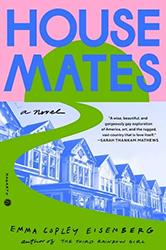Mazeltov, the first novel from Israeli playwright and film director Eli Zuzovsky, is an unconventional coming-of-age story told in vignettes. We see Adam Weizmann being furtively shorn by his father on a magic mountain; performing — or trying to — in his high school play; stumbling on a sexual encounter between two men at his own bar mitzvah; going to his first gay bar. We hear from his narcissistic, disappointed mother, his screw-up of a father, his best friend, and a Palestinian poet who manages to find and claim his own power. Because this is Israel, violence is always about to break out, and the various emotional conflicts represented in the book chime with the larger sociopolitical conflicts of the region.
If you like nontraditional narratives, Mazeltov might be of particular interest to you. There’s a chapter comprising a blowjob narrated in interior monologue with nary a period to be found. Another one that’s mostly lists. And another that’s in blank verse. Zuzovsky also includes a lot of biographical detail in each of his interior monologues; at times, I wish he had let his characters simply live in the moment rather than forcing them to recount their lives leading up to it. For example, when we see Mémé, Adam’s beloved convert grandmother, planted outside the synagogue where Adam is having his bar mitzvah and deciding whether to go in, her timidity and mental and physical frailness are affecting: “Mémé just can’t shake the feeling that if she tries to enter — which she won’t, not yet — the building won’t be able to contain her will vomit her out, perhaps even explode, and she, as usual, will be the one to blame.” But would even someone as hazy as Mémé slip into recalling her life story, beginning with her birth in Salerno, as well as a history of modern Israel as she stands there?
Still, this is a deeply felt novel, wise to the misery of adolescence and of adulthood as well. As a gay Jewish guy myself I naturally identified with many of the situations in which Adam finds himself. Many queer people will relate to the shame that Adam carries with him throughout the world. But in a scene where Adam, having completed his military service, tracks down Khalil, the Palestinian poet, to an East Village gay bar, that shame merges into a collective sense of guilt, a “cognitive dissonance, a condition that he shared with everyone he knew.”
Mazeltov is a book by a Jewish author who dares to imagine not only the struggles of various middle-class Israeli Jews, but also those of a Palestinian. In a day when writers are encouraged to stay in their own lanes and not stray much beyond the borders of their own being, I applaud Zuzovsky’s bravery in bringing together such a diverse group of characters. The heralded publication of Mazeltov is good news for readers and for an overly cautious publishing industry as well.
Jason K. Friedman is the author of the story collection Fire Year, which won the Mary McCarthy Prize in Short Fiction and the Anne and Robert Cowan Writers Award. His article on the Solomon Cohen family, published in Moment magazine, won an American Jewish Press Association Award. He lives in San Francisco, with his husband, filmmaker Jeffrey Friedman.



